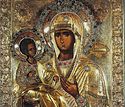

| Previous day | Next day |
| Old Style
July 12
|
Thursday |
New Style
July 25
|
| 5th Week after Pentecost. Tone 3. | No fast.
|
![]() Martyrs Proclus and Hilary, of Ancyra (2nd c.).
Martyrs Proclus and Hilary, of Ancyra (2nd c.). ![]() St. Michael, monk, of Maleinus (962).
St. Michael, monk, of Maleinus (962).
Martyr Golinduc, in holy baptism Mary, of Persia (591). Martyrs Theodore and his son John, the Varangians, at Kiev (983). St. Arsenius of Novgorod, fool-for-Christ (1570). Monk-martyr Simon, founder of Volomsk Monastery (Vologda) (1641). Blessed Serapion, bishop of Vladimir (1275). Translation of the relics of St. Anthony, founder of Leokhnovo Monastery (Novgorod) (1620).
Sts. John (998) and Gabriel (10th c.) of Georgia and Iveron, Mt. Athos. ![]() Icons of the Most Holy Theotokos “Of the Three Hands” of Hilandar, Mt. Athos (7th c.); of Prodromos Skete, Mt. Athos, of Voronezh and of Jackson, California.
Icons of the Most Holy Theotokos “Of the Three Hands” of Hilandar, Mt. Athos (7th c.); of Prodromos Skete, Mt. Athos, of Voronezh and of Jackson, California.
St. Veronica, the woman with the issue of blood who was healed by the Savior (1st c.). Martyr Serapion the New, at Alexandria (194-211). Translation of the relics of New Hieromartyr Momcilo Grgurevic of Serbia (2004).
Repose of Hieromonk Daniel (Fomin) of Optina and Sorochinsk (1953).
Thoughts for Each Day of the Year
According to the Daily Church Readings from the Word of God
By St. Theophan the Recluse

Thursday. [Rom. 15:17-29; Matt. 12:46-13:3]
For whosoever shall do the will of My Father which is in Heaven, the same is My brother, and sister, and mother. By this the Lord gives us to know that the spiritual kinship which He came to plant and raise up on the earth is not the same as fleshly kinship; although in the form of its relationships, the spiritual is the same as the fleshly. The spiritual also contains fathers and mothers—they are those who give birth to people with the word of truth or the gospel, as the apostle Paul says. And it contains also brothers and sisters—they are those who are born spiritually from one person and grow in one spirit. The connection between [spiritual] relatives is founded on the action of grace. It is not external, not superficial, but as deep and alive as the fleshly connection, only it has its place in another much higher and important sphere. This is why it predominates over the fleshly, and when necessary, it brings the fleshly as a sacrifice to its spiritual interests without regret, in full certainty that this sacrifice is pleasing to God and is required by Him.
Friday. [Rom. 16:1-16; Matt. 13:4-9]
The parable about the sower depicts various relationships of souls toward the word of God. In the first group stand those who do not heed the word at all. They hear, but what is heard does not enter into their soul; it lies on its surface, like the seed by the wayside. The word does not fit in them because they have another way of thinking, other principles, other tastes. That is why it soon disappears from memory, is forgotten as if it was not heard at all. The second group is of those who hear the word willingly and receive it quickly, but do not want to bear any labour to fulfil it. Therefore, they delight in the word—especially its promises—until a sacrifice is required. As soon as the necessity arises to sacrifice something for faithfulness to the word, they betray it, renouncing both the word and its promises in order to cater to their attachments. The third group is of those who receive the word and begin to live according to it, but then give themselves over to many cares and sorrows of the world, to earthly concerns, which suppress all the good undertakings which had just formed under the influence of the word of God. The fourth group is of those who receive the word with full faith and resolve to live according to its requirements, with a readiness for all sacrifices and labour, and do not allow their heart to be tied to anything earthly. Sit and decide each of you, to which of these groups you belong.
Articles
 Venerable Simon the Abbot of VolomskHosiomartyr Simon of Volomsk, in the world Simon, son of the peasant Michael from the vicinity of Volokolamsk, was born in the year 1586. |
 St. Veronica (Bernice), a woman healed by ChristAccording to Tradition, Saint Veronica was the woman with the issue of blood, who received healing by touching the hem of Christ’s robe. |







